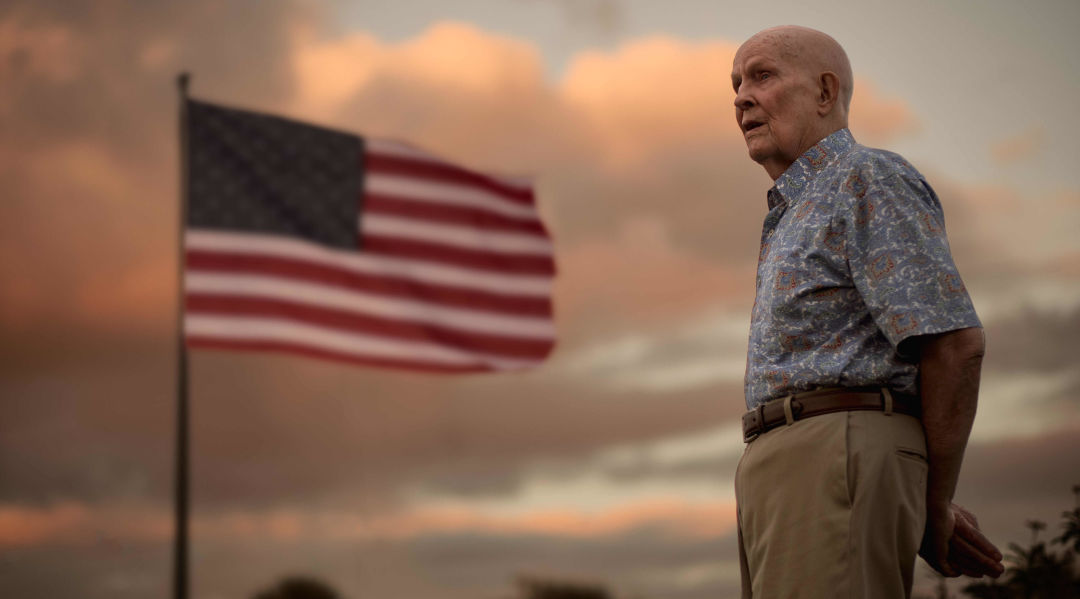Retired General and Venice Resident Gerald E. McIlmoyle Played a Major Role in the Cuban Missile Crisis

Image: Evan Sigmund
At the entrance of a quiet subdivision in Venice, there are no monuments signaling that one of the residents played a leading role in protecting the United States during the Cold War. Which is the way Gerald E. “Jerry” McIlmoyle prefers it. “I’m nobody special, just a hayseed from McCook, Nebraska,” he says.
His 30-year career in the U.S. Air Force tells a different story. He began by piloting U-2 spy planes 13 miles over the earth, capturing photos of the Soviet Union installing nuclear missiles in Cuba in 1962, a provocation that nearly escalated into nuclear war. In the 1970s, McIlmoyle commanded the 341st Strategic Missile Wing, the largest component of the U.S. nuclear arsenal. He also was a top planner for the Strategic Air Command and upgraded the “nuclear football,” the codes given to the president to authorize a nuclear strike. McIlmoyle, now 89, retired from the Air Force in 1981 and for the past 21 years has lived in Venice.
“I came from a little town in the middle of nowhere, but the experiences I had as a child and the integrity and honesty I learned from my parents stayed with me my whole life. One day in gym class the teacher put up ropes from floor to the ceiling and said, ‘Boys, I want you to climb these to the top.’ I was scared of heights, but I was the only one who made it. ‘Look at him,’ the teacher said. ‘He isn’t bigger or stronger than you other boys. But he was determined. He wasn’t going to quit.’
“My parents made us dress up every week and go to Sunday school. I hated it. One Sunday, my mother gave me a dime for the collection box. I threw the dime in the grass and marched off to the park, a real rebel. But then I started thinking how hard my dad worked for that dime and what it was meant for and how terrible it was that I had thrown it away. It took me 30 minutes digging through the grass to find that dime. I have thought about that damn dime many, many times in my life.
“When I was flying the U-2 during the Cuban Missile Crisis, I was fully aware that we were on the precipice of nuclear war. Fidel Castro was crazy, and President Kennedy and [Soviet Premier Nikita] Khrushchev knew it. The Soviets lied about what they were up to in Cuba, but the pictures we took proved what was happening. I’ll never forget President Kennedy telling me eyeball to eyeball, ‘I’ll never be able to thank you enough for bringing back those pictures and allowing me to peacefully settle this crisis.’ I knew he wasn’t just talking to me. He was talking to America.
“Most people have heard of the nuclear football. It’s really a book, a decision matrix, to be used to launch a nuclear strike. I was assigned to put this book together, a flip chart in a briefcase that never leaves the president’s side. I briefed President Reagan on it in Blair House two days before he was inaugurated. It was more than he could absorb. It was like feeding him quantum mechanics through a fire hose.
“I learned as a commander not to succumb to anger or retribution. Once we had a missile crew member get caught throwing something over the fence of the Russian Embassy. The Chairman of the Joint Chiefs asked me, ‘What are we going to do, Jerry?’ I said, ‘Grant him immunity. It’s more important that we learn what he threw across that fence than it is to punish him.’ We got the information we needed: It was a code book, but an old one not in use. Still, it led us to change our codes. We made that crew member finish his service, in a menial job, and we made sure everyone knew what he had done. He was shunned.
“My wife put all my medals up there on the wall in a fancy frame, but do you know how much they mean to me? Zilch. The honor that meant the most to me was our base winning Best Mess Hall in the Air Force two years in a row. That made me happy because it made the people I worked with happy.
“It does not surprise me that we have had these weapons for so many years and we have not annihilated ourselves or the world. I have seen nuclear weapons detonated. I know what they can do. I also have confidence that our nation’s mindset is that we will not be the first to launch a nuclear weapon. But if we get some kook in there [the White House], everything I’ve said is out the window.”
McIlmoyle will appear with author Michael J. Tougias, who featured McIlmoyle in his book, Above & Beyond: John F. Kennedy and America’s Most Dangerous Cold War Spy Mission, April 18, 7 p.m., Historic Chidsey Library, 701 N. Tamiami Trail, Sarasota. foschc.org



